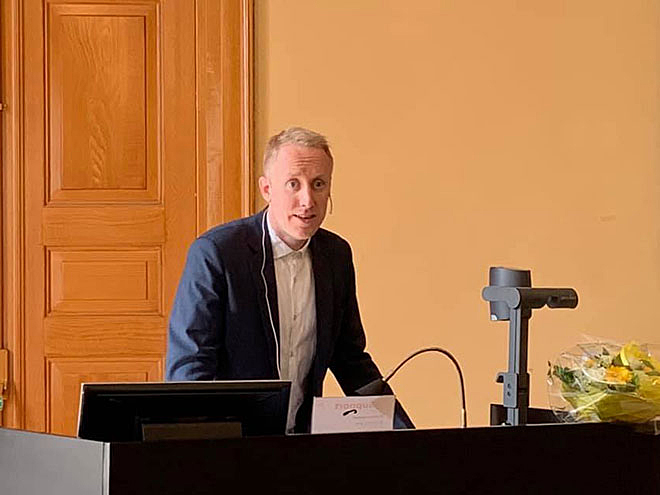The medal is awarded to an outstanding young researcher for a research contribution evaluated by the University of Oslo.
“The entire research group linked to the Utøya Project and the Norwegian Centre for Violence and Traumatic Stress Studies (NKVTS) are honoured by this recognition of Jon Magnus’s work and congratulate him on this prestigious award,” says Professor Grete Dyb, Haga’s main academic supervisor. “This award is an important recognition of excellent research work and a great encouragement to Jon Magnus, the supervisors, co-authors and all the researchers involved in this study,” she continues.
“This is such great news,” says Jon Magnus Haga. “I would like to thank my supervisors and co-authors for their constructive collaboration over many years, and my family, colleagues and friends for all their support along the way. I would also like to thank the participants in the study, who in a very difficult part of their lives chose to share their experiences and emotional reactions with us. This study has only been possible thanks to the participants’ contributions over many years,” he said.
Major significance for emergency preparedness work in many countries
Research on follow-up after terrorist attacks is demanding work. Terrorist attacks are unpredictable incidents, the situation afterwards can be chaotic, and the individuals affected often find themselves in a highly vulnerable situation. Internationally, few studies have been conducted, and only a handful have followed the people affected over time. Much of the current health follow-up in the wake of terrorist attacks is therefore based on unsystematised, experience-based accounts from different incidents, rather than research-based knowledge. This makes the Utøya study conducted by the Norwegian Centre for Violence and Traumatic Stress Studies (NKVTS) and the Institute of Clinical Medicine at the University of Oslo important in both a national and an international context. Jon Magnus Haga’s doctoral work will therefore be of significance for emergency preparedness work in many countries.
Documented strong psychological reactions
Haga monitored the parents’ health problems and health care needs over three years after the terrorist attack on Utøya. This enabled him to prove scientifically that the mothers and fathers of children and young people who are exposed to mortal danger through terrorist attacks can themselves also develop strong psychological reactions and need long-term health follow-up.
The thesis is part of several studies on the 22 July attacks
Haga’s work is part of the Utøya study at NKVTS. In the period following 22 July 2011, the research group conducted three rounds of data collection over three years through clinical interviews with people affected by the terrorist attack. The research group is currently winding up a fourth round of data collection. “Jon Magnus’s work is based on data from the first three rounds of data collection and registry data that we had access to in the study,” says Professor Dyb. Haga himself was actively involved in the third round of data collection: in the planning phase, conducting clinical interviews, collating clinical data with national registries, statistical analyses and the writing process. “In view of the many methodological and ethical challenges associated with this type of research, I find his work particularly meritorious,” explains the proud supervisor.
Active part of the research literature

Haga’s work is currently an active part of the research literature in the field and is central to the exchange of knowledge and experience with researchers in other countries that have experienced terrorism and other acts of violence that require intervention from the authorities. For example, in the ongoing collaboration on civil defence in France, New Zealand and the United Kingdom. The results are thus already playing an important role in the design of future crisis and disaster preparedness, both in Norway and internationally.
“As the head of the study and Jon Magnus’s academic supervisor, I am both proud and encouraged by the fact that his work has been recognised and appreciated by the research community in this way,” says Grete Dyb.
“We would like to congratulate Jon Magnus Haga on the award of His Majesty the King’s Gold Medal for his outstanding doctoral work, which was evaluated in 2019. “We are proud and happy to see that his research work has been valued in this way, and that research into the reactions of close relatives following acts of terrorism is gaining attention”.
Presentation at the Annual Celebration
The medal will be presented at the University’s Annual Celebration on 2 September.
Read more
- Public Defence: Jon Magnus Haga. Defending the thesis "Post-disaster healthcare for parents - a longitudinal study of the mothers and fathers of the Utøya survivors".
- Overview of previous winners of His Majesty the King’s Gold Medal at the University of Oslo.
